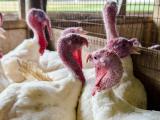Jun 9, 2006 (CIDRAP News) – Australian officials who coordinated an exercise Jun 7 and 8 on pandemic influenza response among Asia-Pacific nations called the drill a success, according to an Agence France-Presse (AFP) story today.
Meanwhile, in Vienna a 2-day international meeting on avian flu that adjourned yesterday called attention to the urgent need for substantial funding and preparedness, especially in Africa, and announced plans for an international meeting in Africa later this year, according to news services.
The pandemic exercise included the 21 countries of the Asia-Pacific Economic Cooperation (APEC). It began in New Zealand and ended yesterday with calls to the United States, according to AFP.
The test scenario involved a new avian flu strain—dubbed the "Malacca Straits Flu"—sparking a pandemic in the region after several infected fishermen were rescued by a cruise ship, AFP reported. APEC countries then needed to respond to the mock crisis and communicate with each other.
"The scenario successfully achieved the goal of testing communication responses during the exercise, which lasted 26 hours across eight time zones," Australian Foreign Minister Alexander Downer and Attorney-General Philip Ruddock said in a statement, according to AFP. They said the exercise "attracted credible responses."
Neil Head, director of development with Emergency Management Australia, which coordinated the exercise, told AFP he found the level of cooperation among countries encouraging.
"The things that make [a pandemic threat] preventable are early detection, close cooperation and information sharing, and the rapid sourcing and the development of appropriate antibodies and medicines," Head told AFP. "The fact that these [countries] seem willing to do all these things, we would have to say, is a very positive outcome."
Detailed results of the drill will be presented at an APEC leaders conference in November, according to the AFP story.
In addition to Australia and New Zealand, APEC countries that played a major role in the drill, according to a Jun 7 Reuters report, were Chile, China, Indonesia, Japan, South Korea, Malaysia, Thailand, and Vietnam.
Africa needs more money, conferees say
Officials at the donors meeting in Vienna this week discussed funding efforts and said Africa now needs $760 million for avian flu preparedness, far more than previously discussed, according to news reports.
The Influenza Partners' Senior Officials Meeting was cosponsored by the United States, the European Union, and China and involved the World Bank, United Nations Food and Agriculture Organization (FAO), World Organization for Animal Health (OIE), and representatives from African countries.
The meeting, said US Under Secretary of State for Global Affairs Paula Dobriansky in a Jun 7 Reuters story, was a "strong . . . appeal to those who have not fulfilled their commitments." Dobriansky, the top US official present, was referring to the $1.9 billion pledged worldwide last January in Beijing to fight avian flu, only $286 million of which has been paid (see link to earlier story below).
The donors meeting determined that Africa now needs $760 million, or three times the funding allocated at the Beijing conference, according to the Reuters report, because in January the H5N1 virus had not been detected on the continent. Since February, at least seven African nations have reported outbreaks, with human cases confirmed in Egypt and Djibouti.
"In Beijing the cost was calculated only for prevention," OIE Director-General Bernard Vallat told Reuters during the Vienna conference. "But when a country is infected, the cost is multiplied by at least three or four."
"We need money to be moving into Africa in support of countries very quickly indeed," added David Nabarro, UN senior coordinator for avian and pandemic influenza, in a Bloomberg report today.
Amid increased concern about Africa's plight, meeting officials announced a follow-up meeting to be held on that continent later this year, according to the Bloomberg story. Host city and specific dates are to be determined, but the story said Bamako, Mali, might be the site.
In other conference news, the European Commission announced it has pledged $58 million to a new trust fund to help developing countries prepare for a possible avian flu outbreak, according to a Reuters report yesterday. This is separate from money already promised during the January Beijing conference.
China, Hungary report poultry outbreaks
China has reported its first avian flu outbreak among poultry since February, AFP reported today. China's Ministry of Agriculture said the H5N1 outbreak occurred on a farm in China's northwestern Xinjiang region, but the number of birds killed by the virus was not specified.
More than 17,100 poultry were culled to contain the outbreak, and the area has been disinfected, Xinhua reported Friday, quoting Ministry of Agriculture sources, according to AFP.
The affected farm is in Hetian County, which is on a flight path for birds migrating between eastern Africa and western Asia, today's AFP story said.
The last reported outbreak in domestic poultry in the country occurred in February in the eastern province of Anhui, AFP reported. The latest incident brings the total of officially reported outbreaks on Chinese farms to 35 since October 2005.
Also today, Hungary reported an outbreak of a deadly strain of H5 avian flu in a flock of domestic geese, according to news accounts. "The suspicion is that it is highly pathogenic H5," Agriculture Ministry Deputy Chief Veterinarian Lajos Bognar told Reuters today.
Hungary detected H5N1 in wild swans in February, but it has reported no H5N1 outbreaks in domestic birds.
An AFP report today said Hungarian officials have slaughtered all 2,300 geese on the affected farm and were also culling poultry and ducks within 1 km of the site in Bacs-Kiskun, in southern Hungary.
Samples have been sent to the European Union's reference lab in Weybridge, UK, to determine whether the H5N1 strain is the culprit.
Also, authorities in Niger have begun culling poultry in the southeastern part of the country to stop H5N1 spread, according to an AFP story today. The slaughter focused on the area of Boko Mai Gao, where avian flu was detected for the first time last week.
Last week's outbreak in Boko Maigao village, 434 miles east of the capital of Niamey and near the Nigerian border, was the first among domestic birds in Niger since February, the AFP report said.
Officials said the culling operation would last one day and that bird owners were being compensated on the spot, according to AFP.
See also:
Jun 5 CIDRAP News story "Global avian flu pledge money slow to arrive



















